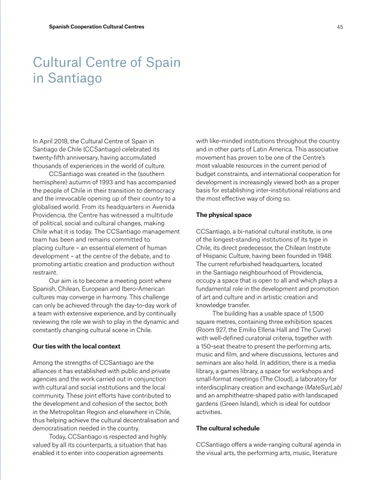Spanish Cooperation Cultural Centres
45
Cultural Centre of Spain in Santiago
In April 2018, the Cultural Centre of Spain in Santiago de Chile (CCSantiago) celebrated its twenty-fifth anniversary, having accumulated thousands of experiences in the world of culture. CCSantiago was created in the (southern hemisphere) autumn of 1993 and has accompanied the people of Chile in their transition to democracy and the irrevocable opening up of their country to a globalised world. From its headquarters in Avenida Providencia, the Centre has witnessed a multitude of political, social and cultural changes, making Chile what it is today. The CCSantiago management team has been and remains committed to placing culture – an essential element of human development – at the centre of the debate, and to promoting artistic creation and production without restraint. Our aim is to become a meeting point where Spanish, Chilean, European and Ibero-American cultures may converge in harmony. This challenge can only be achieved through the day-to-day work of a team with extensive experience, and by continually reviewing the role we wish to play in the dynamic and constantly changing cultural scene in Chile. Our ties with the local context Among the strengths of CCSantiago are the alliances it has established with public and private agencies and the work carried out in conjunction with cultural and social institutions and the local community. These joint efforts have contributed to the development and cohesion of the sector, both in the Metropolitan Region and elsewhere in Chile, thus helping achieve the cultural decentralisation and democratisation needed in the country. Today, CCSantiago is respected and highly valued by all its counterparts, a situation that has enabled it to enter into cooperation agreements
with like-minded institutions throughout the country and in other parts of Latin America. This associative movement has proven to be one of the Centre’s most valuable resources in the current period of budget constraints, and international cooperation for development is increasingly viewed both as a proper basis for establishing inter-institutional relations and the most effective way of doing so. The physical space CCSantiago, a bi-national cultural institute, is one of the longest-standing institutions of its type in Chile, its direct predecessor, the Chilean Institute of Hispanic Culture, having been founded in 1948. The current refurbished headquarters, located in the Santiago neighbourhood of Providencia, occupy a space that is open to all and which plays a fundamental role in the development and promotion of art and culture and in artistic creation and knowledge transfer. The building has a usable space of 1,500 square metres, containing three exhibition spaces (Room 927, the Emilio Ellena Hall and The Curve) with well-defined curatorial criteria, together with a 150-seat theatre to present the performing arts, music and film, and where discussions, lectures and seminars are also held. In addition, there is a media library, a games library, a space for workshops and small-format meetings (The Cloud), a laboratory for interdisciplinary creation and exchange (MateSurLab) and an amphitheatre-shaped patio with landscaped gardens (Green Island), which is ideal for outdoor activities. The cultural schedule CCSantiago offers a wide-ranging cultural agenda in the visual arts, the performing arts, music, literature





























